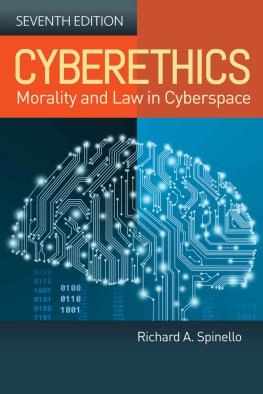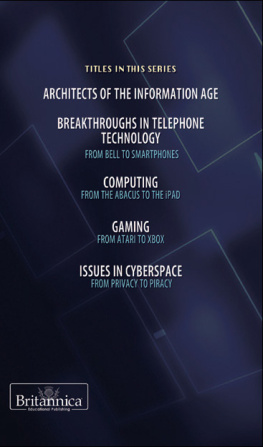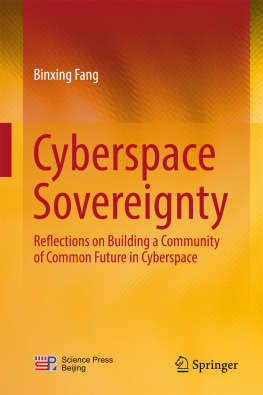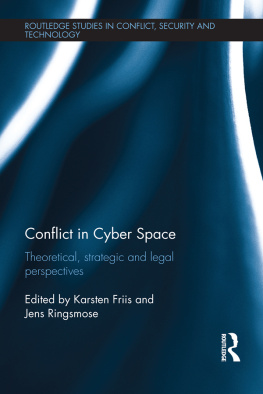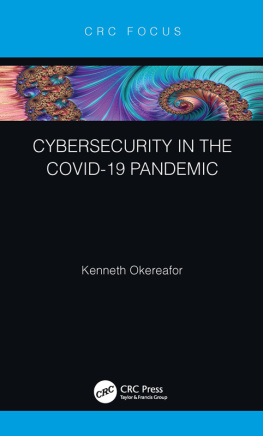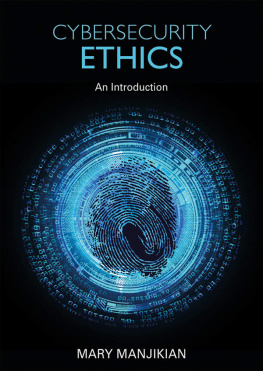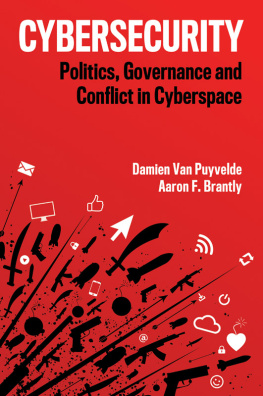SEVENTH EDITION
CYBERETHICS
Morality and Law in Cyberspace
Richard A. Spinello
Professor of Management Practice
Carroll School of Management
Boston College
Chestnut Hill, Massachusetts

JONES & BARTLETT
LEARNING

World Headquarters
Jones & Bartlett Learning
5 Wall Street
Burlington, MA 01803
978-443-5000
www.jblearning.com
Jones & Bartlett Learning books and products are available through most bookstores and online booksellers. To contact Jones & Bartlett Learning directly, call 800-832-0034, fax 978-443-8000, or visit our website, www.jblearning.com.
Substantial discounts on bulk quantities of Jones & Bartlett Learning publications are available to corporations, professional associations, and other qualified organizations. For details and specific discount information, contact the special sales department at Jones & Bartlett Learning via the above contact information or send an email to .
Copyright 2021 by Jones & Bartlett Learning, LLC, an Ascend Learning Company
All rights reserved. No part of the material protected by this copyright may be reproduced or utilized in any form, electronic or mechanical, including photocopying, recording, or by any information storage and retrieval system, without written permission from the copyright owner.
The content, statements, views, and opinions herein are the sole expression of the respective authors and not that of Jones & Bartlett Learning, LLC. Reference herein to any specific commercial product, process, or service by trade name, trademark, manufacturer, or otherwise does not constitute or imply its endorsement or recommendation by Jones & Bartlett Learning, LLC and such reference shall not be used for advertising or product endorsement purposes. All trademarks displayed are the trademarks of the parties noted herein. Cyberethics: Morality and Law in Cyberspace, Seventh Edition is an independent publication and has not been authorized, sponsored, or otherwise approved by the owners of the trademarks or service marks referenced in this product.
There may be images in this book that feature models; these models do not necessarily endorse, represent, or participate in the activities represented in the images. Any screenshots in this product are for educational and instructive purposes only. Any individuals and scenarios featured in the case studies throughout this product may be real or fictitious, but are used for instructional purposes only.
19913-0
Production Credits
VP, Product Management: Amanda Martin
Director of Product Management: Laura Pagluica
Product Manager: Edward Hinman
Product Assistant: Melissa Duffy
Product Coordinator: Paula-Yuan Gregory Project Specialist: Jamie Reynolds
Digital Project Specialist: Angela Dooley
Marketing Manager: Michael Sullivan
Product Fulfillment Manager: Wendy Kilborn
Composition and Project Management: codeMantra U.S. LLC
Cover Design: Scott Moden
Text Design: Scott Moden
Senior Media Development Editor: Troy Liston
Rights & Media Specialist: Rebecca Damon
Cover Image (Title Page, Chapter Opener): Dong Wenjie/Getty Images
Printing and Binding: McNaughton & Gunn
Library of Congress Cataloging-in-Publication Data
Names: Spinello, Richard A., author.
Title: Cyberethics : morality and law in cyberspace / Richard A. Spinello.
Description: Seventh edition. | Burlington, MA : Jones & Bartlett Learning, [2021] | Includes bibliographical references and index.
Identifiers: LCCN 2019042895 | ISBN 9781284184068 (paperback)
Subjects: LCSH: Internet--Moral and ethical aspects. | Cyberspace--Moral and ethical aspects. | Computers and civilization. | Law and ethics.
Classification: LCC TK5105.875.I57 S68 2021 | DDC 303.48/34--dc23
LC record available at https://lccn.loc.gov/2019042895
6048
Printed in the United States of America
24 23 22 21 20 10 9 8 7 6 5 4 3 2 1

Dong Wenjie/Getty Images
CONTENTS

Dong Wenjie/Getty Images
PREFACE
Since the sixth edition of Cyberethics: Morality and Law in Cyberspace appeared several years ago, the social and technical landscape of cyberspace has undergone signifi cant changes. In the United States, the intense debate over net neutrality continues, while the European Union has passed a new set of strict privacy laws known as the General Data Protection Regulation. Major security breaches at companies like Yahoo and Equifax have focused unprecedented attention on cybersecurity. Fake news, propagated on social media platforms like Facebook, disrupted the 2016 Presidential election in the United States, as social media companies grapple with how to deal with disinformation among its several billion users. The clash between Oracle and Google over software copyright protection reveals that, despite the popularity of open source code, some companies still zealously protect their intellectual property. And the new crypto wars have intensifi ed, thanks to the strong encryption now being used for consumer devices like iPhones and software programs such as WhatsApp. We have tried to take these and other developments into account in this new edition.
This technological dynamism, known as the internet, continues to shape our personal and professional lives, but not without social costs. Aside from the growing use of political censorship by tech oligarchs like Google, what is especially worrisome is the more pronounced erosion of privacy with few paths of resistance available for most users. Vast quantities of personal data are extracted and assembled in order to make targeted advertising more precise. Linked to this problem is the matter of information security and the abject failure of many companies to properly safeguard their data.
This Seventh Edition preserves much of the thematic content of previous editions, but also carefully reviews these emerging social problems and the fresh assaults on basic rights such as privacy. Our related purpose is to stimulate the readers refl ection on the broad issues of internet regulation and the behavior of platform monopolies such as Facebook and Google. Have those companies become a threat to individual liberty and free choice?
To accomplish our objectives, we first lay out some theoretical groundwork drawn from the writings of contemporary legal scholars and philosophers such as Kant, Locke, and Finnis. We then focus on four broad areas: censorship and free speech, intellectual property, information privacy, and cybersecurity. For each of these critical areas, we consider the common ethical and public policy problems that have arisen and how technology, law, or some combination of the two would resolve some of those problems.
The first of these four topics concerns the fringes of internet communication, such as pornography, hate speech, and online threats. We review the history of public policy decisions about the problem of pornography and consider in some depth the suitability of automated content controls. Are these controls technically feasible, and can they be used in a way that is morally acceptable to the relevant stakeholders? We also consider other prominent free speech issues, such as private censorship by platforms like Facebook and Twitter, violent video games, and the censorship infrastructures that have been constructed in countries like China.
Next page
